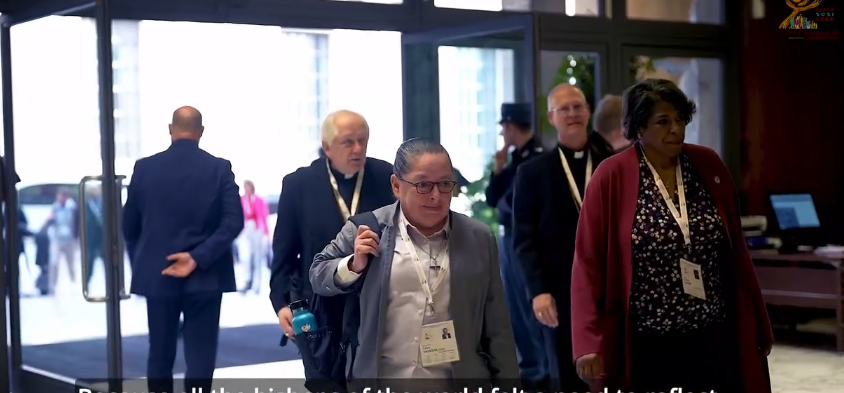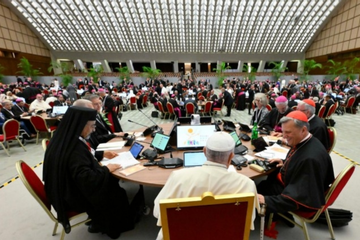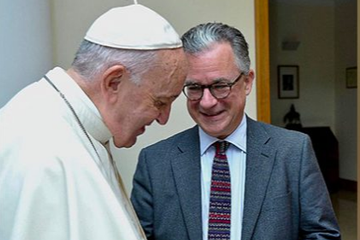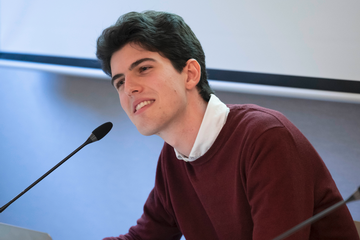
By Filipe Domingues
A summary document of the 16th Ordinary General Assembly of the Synod of Bishops was published Oct. 28 as a partial result of the Synod on Synodality. The document is a fruit of the efforts carried out in a “climate of reciprocal listening and sincere dialogue” during a month of meetings in the Vatican.
After a nearly two-year consultation process in local churches worldwide, more than 360 delegates came to Rome to discuss and propose paths for renewing Church life.
The Synod assembly continued to be a meeting between bishops, but this time it included lay men and women, consecrated people, priests and deacons. The sessions did not aim to provide answers to controversial questions, but to expose important themes for the Church and, as much as possible, identify consensus. In a process of listening to each other – and of listening together to the Holy Spirit – they started from the principle that the synodal style is essential for the Church to move forward.
The synthesis report is in view of preparing for the next assembly to be held October 2024.
“In this summary report, we collect the main elements emerging from the dialogue, prayer and confrontation that characterize these days,” the text reads.
“We discovered, in fact, that walking together as baptized, in the diversity of charisms, vocations, ministries, is important not only for our communities, but also for the world,” it continues.
The three parts of the report address convergences, “matters for consideration” and proposals for various topics.
Church as people of God
The guiding principle of the document is that the Church is both “Mystery and People of God, called to holiness,” as stated at the Second Vatican Council. This means that all members of the Church, through baptism, are equal in dignity, even though each person’s journey and calling may be expressed differently in their life. This principle, in other words, “values ??the contribution of all baptized people, in the variety of their vocations, to a better understanding and practice of the Gospel.”
One of the main fruits of the Synod has been to reinforce in Catholics the “growing awareness of our identity as faithful people of God, within which each one bears a dignity derived from baptism and called to co-responsibility for the common mission of evangelization,” the report states. For this to be fully experienced, it is necessary to build a Church that is “God’s home and family,” closer to people, especially to those who suffer most, one that is “less bureaucratic and more relational.”
Pay attention to those on the ‘outside’
Before any consensus can be reached, in the context of a more synodal Church, the assembly discussed several theological and ecclesial concepts that require further reflection. Starting from Church Tradition, the document says, it will be necessary to revise the Code of Canon Law, so practices and structures can be adjusted to new needs.
Centered on the Word of God and the Eucharist, the document says, it is possible to welcome into the Church members of all “tribes, languages, peoples and nations” (Ap 7,9). And it is necessary to nurture “the same mind… as Jesus Christ” (Phil. 2:5) by recognizing and cultivating “sensitivity to the richness of the variety of expressions of being Church.”
The report states that the world needs a Church to welcome everyone, that is particularly attentive to the poor, to those who are victims of “many forms of material poverty,” those excluded from society and ecclesiastical structures, and those who are vulnerable and suffering – such as migrants, the elderly, the lonely, the exploited, and victims of abuse, war and environmental catastrophes.
The Synod recommends greater dissemination of the teachings of the Church's social doctrine and calls for a reappraisal of the paths of formation and initiation into Christian life.
It also encourages Christian communities to listen to and accompany those furthest from the Church.
“In different ways, people who feel marginalized or excluded from the Church because of their marital status, identity and sexuality also ask to be heard and accompanied, and for their dignity to be defended,” says the text. “In the Assembly, there was a deep sense of love, mercy and compassion for people who are or feel hurt or neglected by the Church, who want a place to return 'home' and where they can feel safe, be heard and respected, without fear of feeling judged. Listening is a prerequisite for us to walk together in search of God's will. The assembly reiterates that Christians must always show respect for the dignity of every person.”
Unity in ministries
Much has been said about the participation of the faithful in the life of the Church and the different ways of experiencing full reciprocity through the various ministries. Some of them are formal ministries, such as the ordained ministry (bishop, priest and deacon) or the instituted ministries (lector, acolyte and catechist). Others are informal, but no less important. They are expressed within and outside the liturgy and include charity to the poor, formation and care for the sick.
In promoting the full communion of all Christians, the assembly recommends getting to know the identity and mission of the Eastern churches and other Christian confessions better. “There cannot be synodality without the ecumenical dimension,” the summary report reads.
There was also much reflection on the role of the bishop as a pastor of the people of God who are entrusted to him and on the interaction, in an increasingly participatory and synodal Church, among local bishops and with the pope, bishop of Rome.
Furthermore, based on the principle that “the Church is a mission” and that “every Christian is a mission in this world,” the assembly reiterates that “the family is the pillar that supports every Christian community.”
The family is “a community of life and love, a privileged place for education in faith and Christian practice, which requires particular support within communities.” Lay men and women “contribute in a vital way to carrying out the mission in all environments and in the most common situations of each day,” it states.
The assembly is especially attentive to two essential categories: young people and women.
“Churches all over the world have expressed a clear request that the active contribution of women would be recognized and valued, and that their pastoral leadership increase in all areas of the Church's life and mission,” says the text. “In order to give better expression to the gifts and charisms of all and to be more responsive to pastoral needs, how can the Church include more women in existing roles and ministries? If new ministries are required, who should discern these, at what levels and in what ways?”
Among the spaces in which lay people, including young people, live, the report mentions digital culture, the world of work and business, youth cultures, economics and politics, scientific research, education, arts and culture, training, work directed toward “care for our common home” and participation in public life. Wherever they are present, lay Christians “are called to witness to Jesus Christ in everyday life and to explicitly share the faith with others.”


